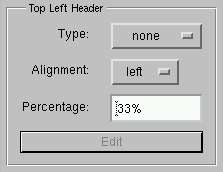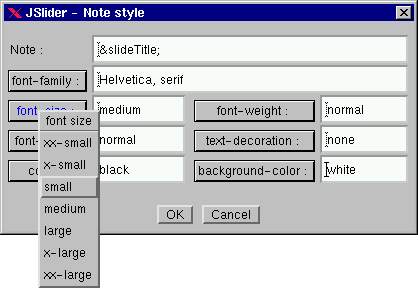Using JSlider editor
JSlider editor is an editor for most of the properties used in the
template file. Basically you have seven parts in the interface. Six of
those parts are used to customize the headers, one is used to customize
the general slides properties.
Slides'layout
--------------------------------------------------------------------
| topLeft header | topCenter header | topRight header |
--------------------------------------------------------------------
| topLine |
|------------------------------------------------------------------|
| |
| |
| |
| |
| |
| this part contains your text |
| |
| |
| |
| |
| |
|------------------------------------------------------------------|
| bottomLine |
--------------------------------------------------------------------
| bottomLeft header | bottomCenter header | bottomRight header |
--------------------------------------------------------------------
Headers
Each headers have the following properties :
You can edit the header graphic properties. By clicking on the edit
button, a dialog box appears (depending on the header's type). Here is an
example of the dialog used by the type note. You can change all
the properties, like the font-size as follow.
For more details about the allowed values in each TextField, you can see
the CSS1
specifications. Basic CSS values can be selected by clicking on the
each property button.
The global properties are those that will be applied in your text
(contained in a html file). You can choose if you want a line at the top
and/or at the bottom of your slides. This line can be solid, or an image.
Template file format
The template file is an ASCII file you can edit with emacs. It contains
all the properties you want to apply to your slides. For futher details
and a complete description of all properties, you can have a look on the
full description of whole properties. Here
are only some examples :
# put <h1> as the slide delimiter
separator: h1
# put the background color of the slide to silver
background-color : silver
# put the font-family to Helvetica
font-family: Helvetica, sans-serif
# the location of the navigation buttons
next-url: ./graphics/right.gif
toc-url: ./graphics/up.gif
prev-url: ./graphics/left.gif
logo-url: ./graphics/logoESSI.gif
For headers'properties, you must prefix the properties by the header's
name : topLeft, topCenter, topRight, bottomLeft, bottomCenter and
bottomRight.
# the top left header contains slide's title
topLeft.type: title
# the top right header contains a logo
topRight.type: logo
topRight.logo-url: http://www.inria.fr/koala/graphics/koala-postcard.gif
# bottom center header contains a footnote with special colors
bottomCenter.type: note
bottomCenter.note: quake rules
bottomCenter.background-color: blue
bottomCenter.color: #FFFFFF
You can defined macros in the template file as follow
macro.salut: hi, salut, bonjour
and reuse them in a note header like this :
topLeft.type: note
topLeft.note: &salut;
Here are the predifined macros, some of them are computed at runtime :
&author1-name; - the name of the first author
&author1-url; - the url of the first author
&author2-name; - the name of the second author
&author2-url; - the url of the second author
¤tPage; - the current page of the slide (runtime)
&maxPage; - the last page of the slide (runtime)
&day; - the day in a week (runtime)
&iday; - the day number (runtime)
&month; - the month (runtime)
&imonth; - the month number (runtime)
&year; - the year (runtime)
¤tTitle; - the title of the slide (runtime)
&mainTitle; - the main title (runtime, given by the <title> tag)
&date; - the date (depending on the language)
&tocTitle; - the title of the table of contents
You can create macros by using macros
# default date for different languages
macro.dateEn: &month; &year;
macro.dateFr: &day; &iday; &month; &year;
Copyright
Copyright 1998 Thierry Kormann and Philippe Le Hégaret
Permission to use, copy, modify, and to distribute this software and
its documentation for any purpose is hereby granted without fee,
provided that the above Copyright notice appear in all copies and that
both that Copyright notice and this permission notice appear in
supporting documentation.
Thierry Kormann and Philippe Le Hégaret makes no representations
about the suitability of this software for any purpose. It is provided
"as is" without express or implied warranty.
Thierry Kormann and Philippe Le Hégaret disclaims all warranties with regard
to this software, including all implied warranties of merchantability
and fitness, in no event shall Thierry Kormann and Philippe Le Hégaret be
liable for any special, indirect or consequential damages or any
damages whatsoever resulting from loss of use, data or profits, whether
in an action of contract, negligence or other tortious action, arising
out of or in connection with the use or performance of this software.
JSlider - Version 1.0 - March 1998
Authors :
Thierry Kormann
tkormann@sophia.inria.fr
http://www.inria.fr/koala/thierry/
Philippe Le Hégaret
plehegar@sophia.inria.fr
http://www.inria.fr/koala/plh/
Greetings...
Greetings fly to :
Arnaud Le Hors, Colas Nahaboo, Philippe Kaplan, Yves
Lafon, Stephan Montigaud, Bert Bos, Benoit Mahé, Michel Buffa.
Special regards go to :
Jean Philippe Orsini, Vincent Mallet,
Olivier and Johanna Nobili, Sébastien Schneider, Oliv, Sonic boys,
Stéphane Vinter, Adil Mehdaoui, Frédéric Béringer and all others we forgot.
Big Kisses to :
Karine, Sévy, Karen and Cynthia.
Hardware used to code JSlider :
- PC Linux
-
- biPII300 (600.74 bogoMIPS)
- RAM : 64 Mo
- Matrox Millenium || (AGP)
- monitor : 21" (Digital)
- Hard drive : 2.3 Go
- PC Linux
-
- biPII200 (398.14 bogoMIPS)
- RAM : 128 Mo
- Matrox Millenium
- 3DFx
- monitor : 24" (Sony)
- Hard drive : 1.8 Go
- HiNote, PC Windows
-
- P166
- RAM : 64 Mo
- Hard drive : 1.2 Go



